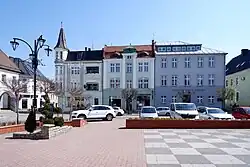Krapkowice | |
|---|---|
 Market square | |
 Flag  Coat of arms | |
 Krapkowice | |
| Coordinates: 50°28′N 17°58′E / 50.467°N 17.967°E | |
| Country | |
| Voivodeship | Opole |
| County | Krapkowice |
| Gmina | Krapkowice |
| Government | |
| • Mayor | Piotr Solloch |
| Area | |
| • Total | 20.91 km2 (8.07 sq mi) |
| Population (2019-06-30[1]) | |
| • Total | 16,301 |
| • Density | 780/km2 (2,000/sq mi) |
| Time zone | UTC+1 (CET) |
| • Summer (DST) | UTC+2 (CEST) |
| Postal code | 47-300 and 47-303 for Otmęt district |
| Car plates | OKR |
| Website | https://krapkowice.pl |
Krapkowice ([krapkɔˈvʲit͡sɛ] ⓘ; German: Krappitz; Silesian: Krapkowicy) is a town in southern Poland with 16,301 inhabitants (2019), situated in the Opole Voivodeship, straddling both banks of the Oder River at the point where it joins with the Osobłoga. It is the regional capital of Krapkowice County.
Traditionally this Upper Silesian town was a centre for leather, paper and cement manufacturing. Today only the paper and leather industries remain. For example, in Krapkowice the toilet paper brand Mola is produced by a major job provider, Metsä.
Notable people
- Mikuláš Albert z Kaménka (c.1547–1617), Czech priest and translator
- Wilhelm Alexander Freund (1833–1917)[2]
- Ottomar Rosenbach (1851–1907), German physician
- Hertha Pohl (1889–1954), writer
- Krzysztof Zwoliński (born 1959), Polish athlete
- Alice Bota (born 1979), Polish-German journalist
Twin towns – sister cities
References
- ↑ "Population. Size and structure and vital statistics in Poland by territorial division in 2019. As of 30th June". stat.gov.pl. Statistics Poland. 2019-10-15. Retrieved 2020-02-14.
- ↑ Jewish Encyclopedia
External links
- Official town webpage
- KRAPKOWICE.net - Portal of Krapkowice County (in Polish)
- KRAPKOWICE.NET.PL - Krapkowicki Weekly (in Polish)
- Jewish Community in Krapkowice on Virtual Shtetl
This article is issued from Wikipedia. The text is licensed under Creative Commons - Attribution - Sharealike. Additional terms may apply for the media files.